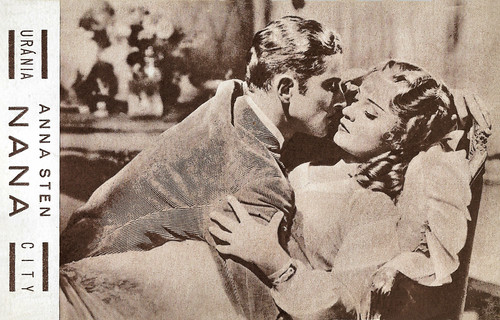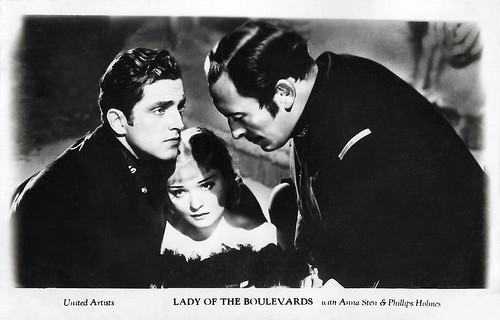Nana (Dorothy Arzner, George Fitzmaurice, 1934), starring Ukrainian-born Anna Sten, is an American film, produced by Samuel Goldwyn, and released through United Artists. This version of Émile Zola's famous novel was to be the vehicle for Sten's triumph as Samuel Goldwyn's trained, groomed and heavily promoted answer to Greta Garbo. Despite a record-breaking opening week at Radio City Music Hall, Sten was beautiful but disappointing.

British postcard in the Famous Film Stars Series by Valentine's, no. 7123B. Photo: United Artists. Publicity still for Nana (Dorothy Arzner, George Fitzmaurice, 1934).

British postcard by De Reszke Cigarettes, no. 6. Photo: United Artists. Publicity still for Nana (Dorothy Arzner, George Fitzmaurice, 1934).

Dutch postcard by JosPe, Arnhem, no. 612. Anna Sten in Nana (Dorothy Arzner, George Fitzmaurice, 1934).

Hungarian postcard by Globus, Budapest. Photo: United Artists / City Film. Phillips Holmes and Anna Sten in Nana (Dorothy Arzner, George Fitzmaurice, 1934).

Hungarian postcard by Globus, Budapest. Photo: United Artists / City Film. Publicity still for Nana (Dorothy Arzner, George Fitzmaurice, 1934).

Portuguese postcard by Tip. Costa Sanches, Lisboa (Lisbon). Photo: publicity still for Nana (Dorothy Arzner, George Fitzmaurice, 1934).
Her MGM contract up, the elusive Greta Garbo had returned to Sweden for several months during 1932-1933. Various Hollywood moguls tried to fill the gap by finding a "New Garbo". While she worked in Germany, Ukrainian-born actress Anna Sten came to the attention of Samuel Goldwyn. He decided to build her up as the rival of, and possible successor to Garbo.
For two years Goldwyn had his new star tutored in English and taught Hollywood screen acting methods. Goldwyn's tutoring of Sten is mentioned in Cole Porter's 1934 song 'Anything Goes' from the musical of the same name: "If Sam Goldwyn can with great conviction / Instruct Anna Sten in diction / Then Anna shows / Anything goes."
Her first American film was Nana (1934), directed by Dorothy Arzner and George Fitzmaurice. Fitzmaurice was fired and replaced by Arzner. Her co-stars were Lionel Atwill, Richard Bennett, Mae Clarke and Philips Holmes. Nana was a somewhat homogenised version of Emile Zola's scandalous novel.
In 1860s Paris, beautiful Nana is the toast of the Paris theatre. She falls in love with handsome lieutenant George Muffat (Phillips Holmes). When his older brother colonel Andre (Lionel Atwill) finds out that Nana is also the mistress of the elderly impresario Gaston Greiner (Richard Bennett), he forbids his brother to marry her, but then Andre falls for her himself.
Wes Connors at IMDb: "Sten, who had already proved herself an accomplished and versatile actress, comes across as unable to handle the lead role. A good supporting cast, fine photography from Gregg Toland, and capable direction by Dorothy Arzner failed to create anything approaching Garbo or Dietrich. Ironically, Garbo's own Camille (1936) would later cover much of the territory attempted in Nana."
Tracy Figueira at IMDb: "The problem is that there was no way Hollywood in 1934 could do justice to Emile Zola's scathing account of sexual debauchery in Second Empire Paris. The nudity is gone, most of the lovers are gone, the lesbian relationship with Satin (Mae Clarke) is barely hinted at. Nana, as played by Sten, is a far more sympathetic character than she is in the book. She shoots herself rather than rotting to death from smallpox (a euphemism for syphilis?) No mention is made of her illegitimate child or the path of death and destruction she leaves in her wake. The film is an interesting if dated curio, worth watching at least once, but proof that not every film from Hollywood's 'Golden Age' is a gem."
Nana was a box office disappointment, as were Anna Sten's two subsequent Goldwyn films, We Live Again (Rouben Mamoulian, 1934) and The Wedding Night (King Vidor, 1935) with Gary Cooper. Reluctantly, Goldwyn dissolved his contract with his ‘new Garbo'.

British postcard in the Filmshots series by Film Weekly. Photo: United Artists. Philips Holmes, Anna Sten and Lionel Atwell in Nana (Dorothy Arzner, George Fitzmaurice, 1934). Lady of the Boulevards was the British title of Nana.

British postcard in the Filmshots series by Film Weekly. Photo: United Artists. Anna Sten and Lionel Atwell in Nana (Dorothy Arzner, George Fitzmaurice, 1934).

British postcard in the Filmshots series by Film Weekly. Photo: United Artists. Anna Sten and Richard Bennett in Nana (Dorothy Arzner, George Fitzmaurice, 1934).

British postcard in the Filmshots series by Film Weekly. Photo: United Artists. Lionel Atwell, Anna Sten and Richard Bennett in Nana (Dorothy Arzner, George Fitzmaurice, 1934).

British card. Photo: United Artists. Publicity still for Nana (Dorothy Arzner, George Fitzmaurice, 1934).
Sources: Wikipedia and IMDb.

British postcard in the Famous Film Stars Series by Valentine's, no. 7123B. Photo: United Artists. Publicity still for Nana (Dorothy Arzner, George Fitzmaurice, 1934).

British postcard by De Reszke Cigarettes, no. 6. Photo: United Artists. Publicity still for Nana (Dorothy Arzner, George Fitzmaurice, 1934).

Dutch postcard by JosPe, Arnhem, no. 612. Anna Sten in Nana (Dorothy Arzner, George Fitzmaurice, 1934).

Hungarian postcard by Globus, Budapest. Photo: United Artists / City Film. Phillips Holmes and Anna Sten in Nana (Dorothy Arzner, George Fitzmaurice, 1934).

Hungarian postcard by Globus, Budapest. Photo: United Artists / City Film. Publicity still for Nana (Dorothy Arzner, George Fitzmaurice, 1934).

Portuguese postcard by Tip. Costa Sanches, Lisboa (Lisbon). Photo: publicity still for Nana (Dorothy Arzner, George Fitzmaurice, 1934).
A homogenised version of a scandalous novel
Her MGM contract up, the elusive Greta Garbo had returned to Sweden for several months during 1932-1933. Various Hollywood moguls tried to fill the gap by finding a "New Garbo". While she worked in Germany, Ukrainian-born actress Anna Sten came to the attention of Samuel Goldwyn. He decided to build her up as the rival of, and possible successor to Garbo.
For two years Goldwyn had his new star tutored in English and taught Hollywood screen acting methods. Goldwyn's tutoring of Sten is mentioned in Cole Porter's 1934 song 'Anything Goes' from the musical of the same name: "If Sam Goldwyn can with great conviction / Instruct Anna Sten in diction / Then Anna shows / Anything goes."
Her first American film was Nana (1934), directed by Dorothy Arzner and George Fitzmaurice. Fitzmaurice was fired and replaced by Arzner. Her co-stars were Lionel Atwill, Richard Bennett, Mae Clarke and Philips Holmes. Nana was a somewhat homogenised version of Emile Zola's scandalous novel.
In 1860s Paris, beautiful Nana is the toast of the Paris theatre. She falls in love with handsome lieutenant George Muffat (Phillips Holmes). When his older brother colonel Andre (Lionel Atwill) finds out that Nana is also the mistress of the elderly impresario Gaston Greiner (Richard Bennett), he forbids his brother to marry her, but then Andre falls for her himself.
Wes Connors at IMDb: "Sten, who had already proved herself an accomplished and versatile actress, comes across as unable to handle the lead role. A good supporting cast, fine photography from Gregg Toland, and capable direction by Dorothy Arzner failed to create anything approaching Garbo or Dietrich. Ironically, Garbo's own Camille (1936) would later cover much of the territory attempted in Nana."
Tracy Figueira at IMDb: "The problem is that there was no way Hollywood in 1934 could do justice to Emile Zola's scathing account of sexual debauchery in Second Empire Paris. The nudity is gone, most of the lovers are gone, the lesbian relationship with Satin (Mae Clarke) is barely hinted at. Nana, as played by Sten, is a far more sympathetic character than she is in the book. She shoots herself rather than rotting to death from smallpox (a euphemism for syphilis?) No mention is made of her illegitimate child or the path of death and destruction she leaves in her wake. The film is an interesting if dated curio, worth watching at least once, but proof that not every film from Hollywood's 'Golden Age' is a gem."
Nana was a box office disappointment, as were Anna Sten's two subsequent Goldwyn films, We Live Again (Rouben Mamoulian, 1934) and The Wedding Night (King Vidor, 1935) with Gary Cooper. Reluctantly, Goldwyn dissolved his contract with his ‘new Garbo'.

British postcard in the Filmshots series by Film Weekly. Photo: United Artists. Philips Holmes, Anna Sten and Lionel Atwell in Nana (Dorothy Arzner, George Fitzmaurice, 1934). Lady of the Boulevards was the British title of Nana.

British postcard in the Filmshots series by Film Weekly. Photo: United Artists. Anna Sten and Lionel Atwell in Nana (Dorothy Arzner, George Fitzmaurice, 1934).

British postcard in the Filmshots series by Film Weekly. Photo: United Artists. Anna Sten and Richard Bennett in Nana (Dorothy Arzner, George Fitzmaurice, 1934).

British postcard in the Filmshots series by Film Weekly. Photo: United Artists. Lionel Atwell, Anna Sten and Richard Bennett in Nana (Dorothy Arzner, George Fitzmaurice, 1934).

British card. Photo: United Artists. Publicity still for Nana (Dorothy Arzner, George Fitzmaurice, 1934).
Sources: Wikipedia and IMDb.
No comments:
Post a Comment